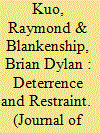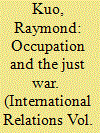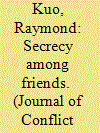| Srl | Item |
| 1 |
ID:
183145


|
|
|
|
|
| Summary/Abstract |
Multinational military exercises are among the most notable demonstrations of military cooperation and intent. On average, one is initiated every 8.9 days. But it has often been argued that joint military exercises (JMEs) increase the risk of war. Using a relational contracting approach, we claim that formal military alliances mediate the effect of JMEs. Exercises and alliances serve complementary functions: The former allows targeted responses to military provocations by adversaries, while the latter provides institutional constraints on partners and establishes a partnership’s overall strategic limitations. In combination, alliances dampen the conflict escalation effects of exercises, deterring adversaries while simultaneously restraining partners. We test this theory using a two-stage model on directed dyadic data of JMEs from 1973 through 2003. We find that JMEs in general do not escalate conflict, and that JMEs conducted with allies in particular reduce the probability of conflict escalation.
|
|
|
|
|
|
|
|
|
|
|
|
|
|
|
|
| 2 |
ID:
084264


|
|
|
|
|
| Publication |
2008.
|
| Summary/Abstract |
Just war theorists have had difficulty assessing the moral character of occupations, since they often fail to engage with the broader mechanisms and ethical issues of control and power inherent to that state of conflict. These challenges, however, cut to the heart of many of the just war tradition's assumptions, requiring new conceptualizations of its principles and rules for appropriate conduct. This article takes a first step in that direction, recasting the tradition to encompass a wider view of threat and violence in military occupations, using the Israel-Palestine conflict as an illustrative case.
|
|
|
|
|
|
|
|
|
|
|
|
|
|
|
|
| 3 |
ID:
173766


|
|
|
|
|
| Summary/Abstract |
Scholars think that friendly nations adopt secrecy to avoid domestic costs and facilitate cooperation. But this article uncovers a historical puzzle. Between 1870 and 1916, over 80 percent of alliance ties were partially or completely covert. Otherwise, hidden pacts are rare. Why was secrecy prevalent in this particular period and not others? This article presents a theory of “portfolio consistency.” Public agreements undermine the rank of hidden alliances. A partner willing to openly commit to another country but not to you signals the increased importance of this other relationship. States pressure their covert partners to avoid subsequent public pacts. This creates a network effect: the more secret partners a state has, the greater the incentives to maintain secrecy in later military agreements. Covert alliances have a cumulative effect. In seeking the flexibility of hidden partnerships, states can lock themselves into a rigid adherence to secrecy.
|
|
|
|
|
|
|
|
|
|
|
|
|
|
|
|